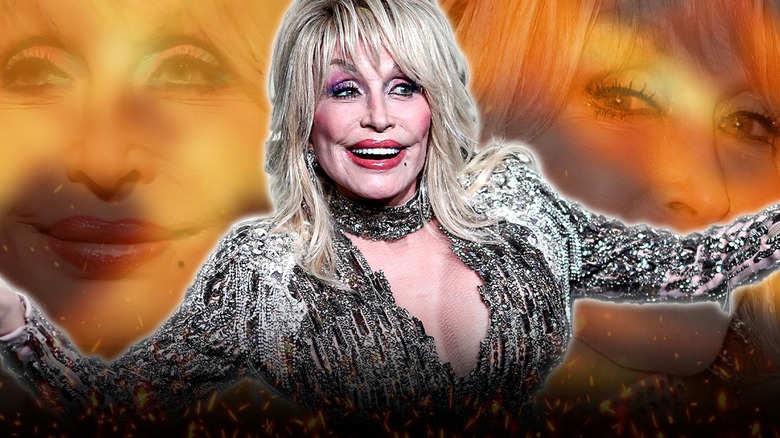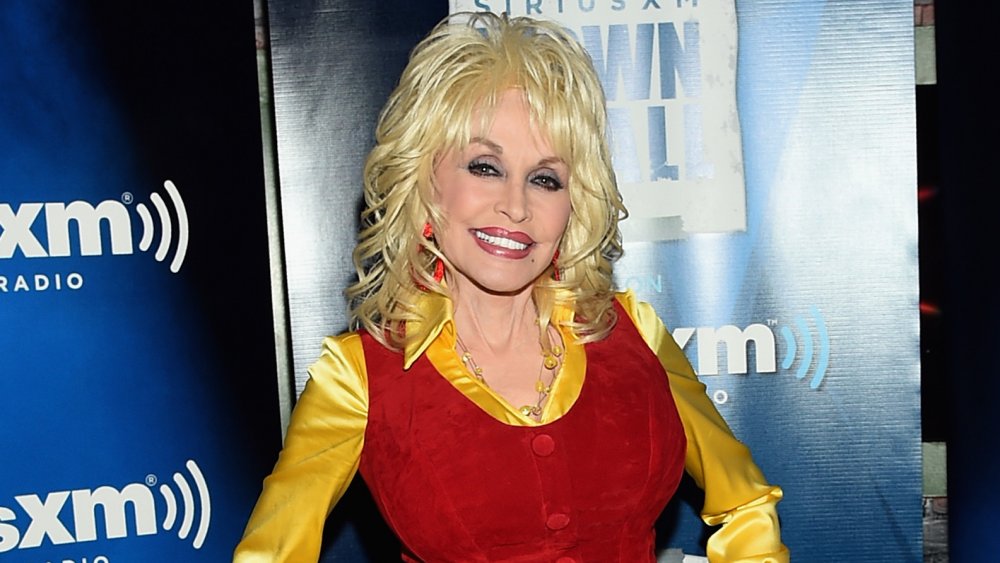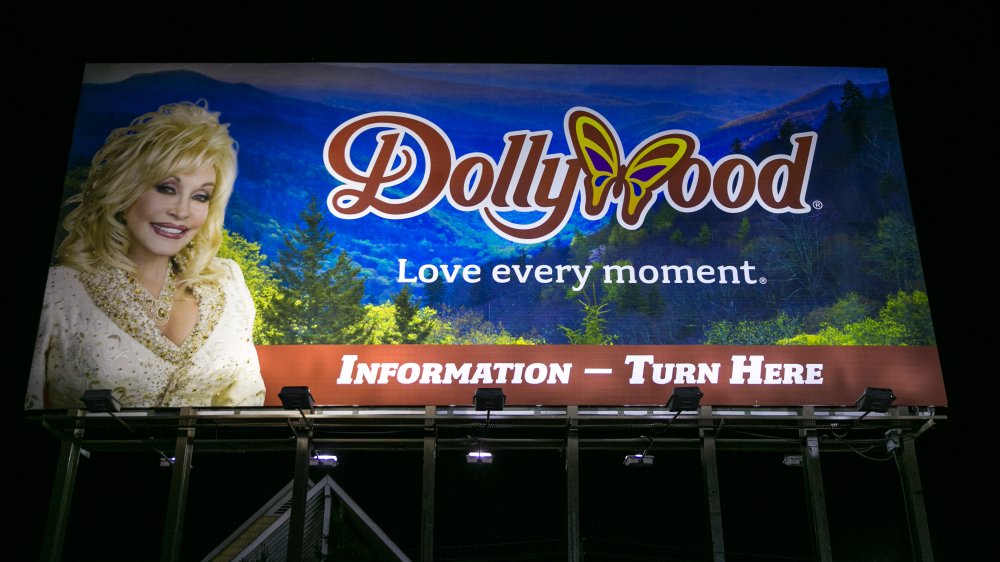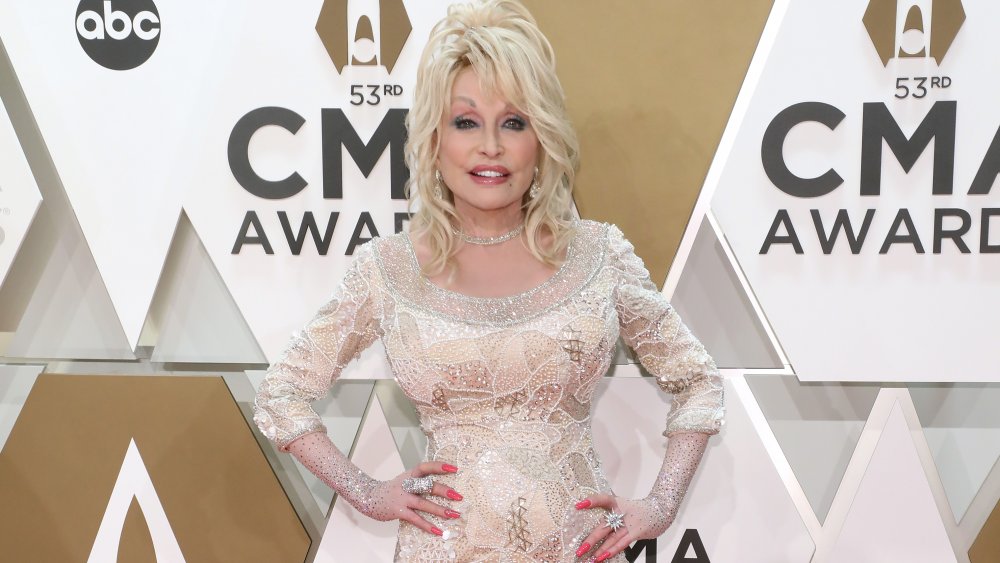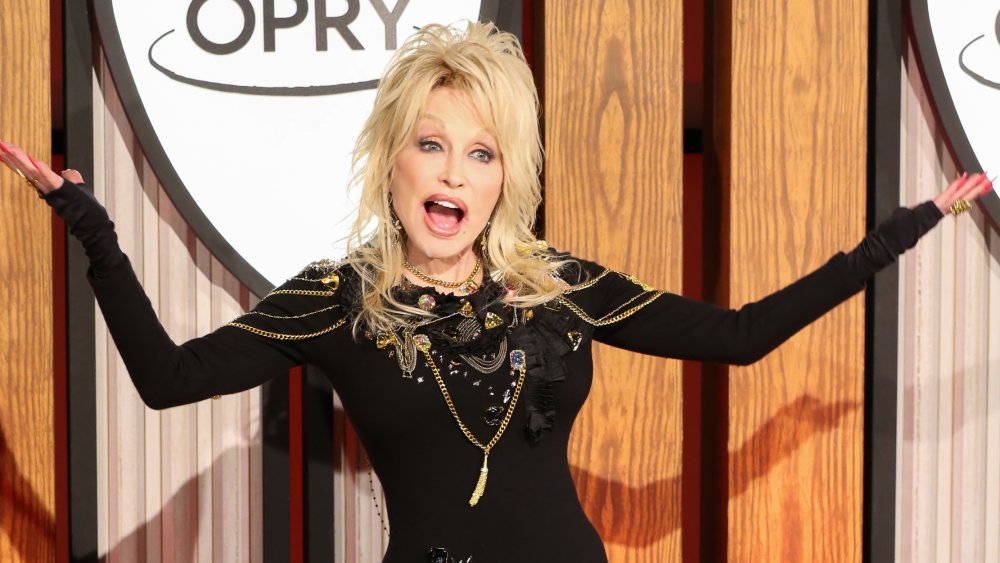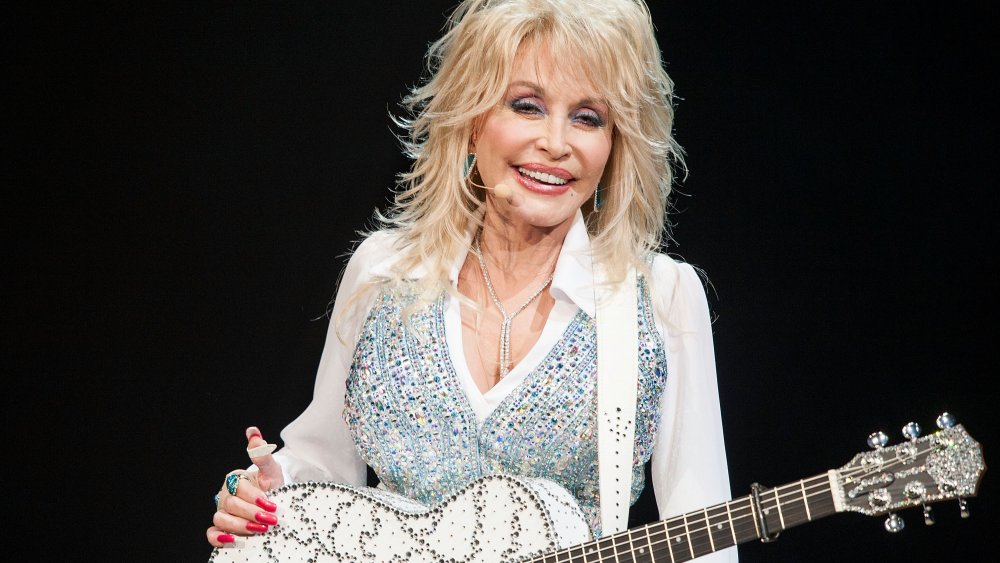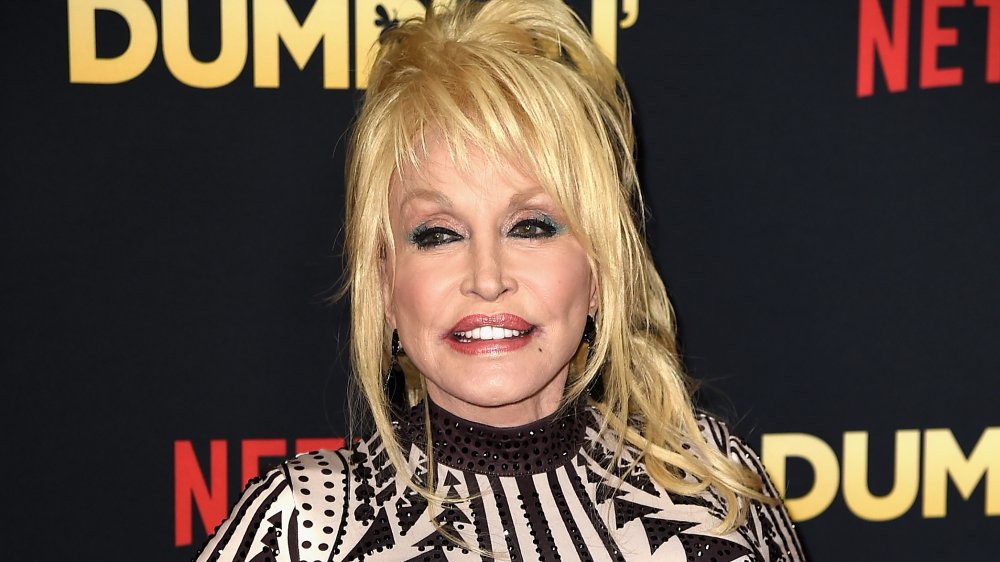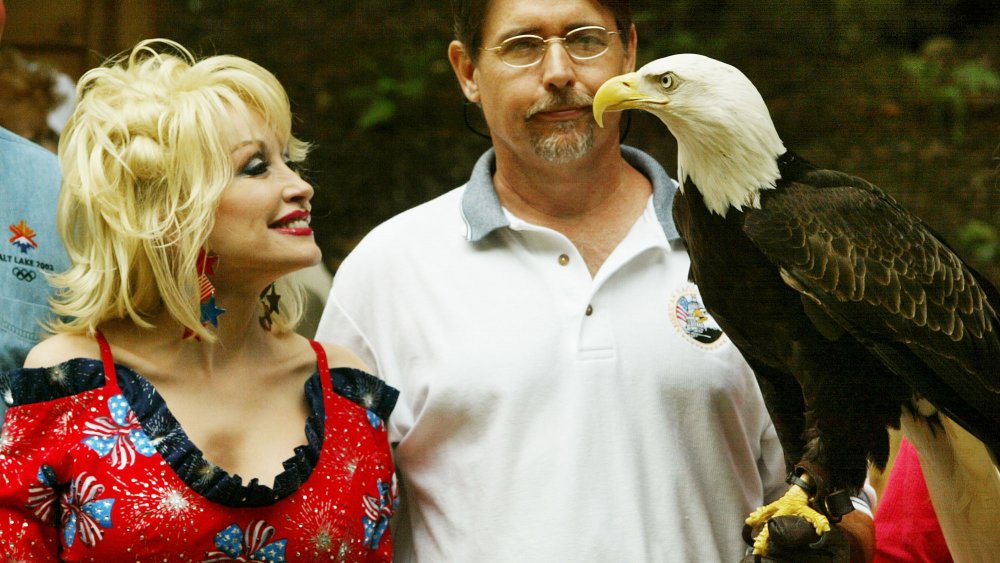The Dark Side Of Dollywood
Dolly Parton isn't just famous for her larger-than-life style or her music. She is also the co-owner of the Dollywood theme park in Pigeon Forge, Tenn. In 1986, Parton partnered with Jack and Pete Herschend, who had developed a small attraction called Rebel Railroad into the lager Appalacian homage that became known as Silver Dollar City. With Parton's help, and yet another rebrand, the trio grew the business into what it is today: a 150-acre park with multiple rides for thrill seekers and plenty of attractions for the whole family.
With a motto of "Love every moment" and the spotless reputation of one of America's most beloved performers behind it, what could go wrong? Well, the park claims that it has "something for everyone and every interest," which might actually be true because some visitors have even found some disturbing things in the park over the years. To paint the clearest picture of the Dolly Parton theme park's history, it's important to look at some of the park's lowest moments. For that, we explore the dark side of Dollywood.
Raining on gay day at Dollywood
Dolly Parton has long had fans in the LGBTQ+ and drag communities. She famously says, "If I hadn't been a woman I would have been a drag queen." She's also been called a "patron saint of drag queens," so it shouldn't be a surprise that gay fans started flocking to Dollywood in the mid 2000s. According to The New York Times, the gay crowds eventually organized a "gay day" at the park, inspired by the Disney World version in which they wear red shirts.
Yet, the good times were short lived, as Parton and the park never officially recognized it. In fact, park officials even had their lawyers send a cease and desist letter to the organizers regarding the Dollywood name. Yikes. That sounds bad, right? Well, it gets worse, because "gay day" also needed to compete with protesters from the Ku Klux Klan.
According to the Southern Standard, hoodless members of the white supremacist group coordinated protests as a "demonstration against homosexuality" on the same day as the "gay day." One of the protesters, Randy Gray, said that the day was "totally opposite of what theme parks are for." He added, "Theme parks have always been for families. They're going there, I believe, to rub it in our faces, to be like 'Ha, ha, we're finally getting our way." Facing threats from the KKK and getting little support from the park and the patron saint, "gay day" organizers eventually "disbanded" after five years.
Don't wear your political t-shirt to Dollywood
In 2011, Dollywood PR took a bit of hit when Olivier Odom revealed that she had been asked to cover up her "Marriage is So Gay" t-shirt. "When we got to Dollywood Splash Country, the man at the entry gate whispered in my ear that I needed to turn my shirt inside out," she told The Atlantic. Apparently, the shirt violated Dollywood's dress-code policy, which states that clothing deemed offensive may need to be turned inside out.
According to Odom and her wife, Jennifer Tipton, the worst part of the encounter was what the gatekeeper told them. "He said it was a family park," Tipton told the Knoxville News Sentinel. "Families come in a wide range of definitions these days. ... We were with our family." Odom turned the shirt inside-out and went in. "I didn't want to make a scene in front of the girls," she said. "I wanted them to have a fun time, so I went ahead and did it and figured that I could handle it more tactfully outside of the park setting."
"Dollywood is open every day to everybody," said Pete Owens, a spokesperson for the park. He also said that the gatekeeper was within his rights to deny the couple entry. "If you'll walk around the park you'll see that it's very ethnically and socially diverse. There are families of all kinds ... We've been very inclusive of everyone and I'm proud of that record that we've had through the years."
Is danger part of the thrill for Dollywood rides?
Unfortunately, accidents in theme parks often come with the territory. Large crowds and heavy moving equipment don't always mesh. For many years, Dollywood managed to keep a relatively clean bill of health, but that seemed to change in 2013. In that year, Tedi and Derryl Brown experienced a traumatizing experience on the park's Waltzing Swinger ride.
According to their report in TMZ, the park ignored the slick conditions on that rainy day and it resulted in Tedi slipping out of her seat. She allegedly, "hung on for dear life" before losing her grip and "falling head first onto the hard concrete, 10-ft. below." As a result, she reportedly suffered "lasting brain damage and broken bones." The Brown family later sued the park for $475,000 in damages. In a subsequent TMZ report, the park responded by saying a rider would have had to "intentionally unlatch" the lap bar before the ride stopped in order to get out. The last known update on the suit was a "report of mediation" in March 2016.
In 2018, the park was sued again, this time after a mother of two allegedly injured her spine on the RiverRush Water Coaster. According to TMZ, the park was sued for "$2 million for negligence and failure to properly warn of the dangers of the ride." In 2020, more injuries were incurred at the park, including three guests who were hurt when a decoration fell from a ride. A park employee was also injured in a glassblowing incident.
Maybe Dolly Parton was onto something when she revealed that even she wont ride the amusements at Dollywood.
Is 'don't ask don't tell' the lay of the land at Dollywood?
With Dolly Parton's strong and vocal support of the LGBTQ+ community and the connection to the "gay day" event, Dollywood has always seemed like a safe space for the LGBTQ+ community. The New York Times famously described the park as "A Little Bit Country, a Little Bit Gay" in a 2014 headline, and wrote that "many feel that Dollywood is a safe haven in the rural South." In a part of the country where people could be "evicted or fired based on sexual orientation" at the time, Dollywood seemed to attract many LGBTQ+ performers and staff.
Yet, not all the staff felt confident that the park would protect them if they divulged their sexual orientation. According to The New York Times, the co-owners of the park, Herschend Family Entertainment, end their mission statement with the phrase, "All in a manner consistent with Christian values and ethics." Because of this, some staff members told the outlet that "they fear their jobs might be at risk if they didn't keep a low profile."
A spokeswoman for the company, Fatima Mehdikarimi, said that was disconcerting news. "Frankly, if Dolly ever heard that, it would break her heart," she said, adding, "We are technically a Christian company, but at the same time the biggest thing we have is that everybody's on the same level playing field."
Stamping out the dixie at Dollywood
For years, Dollywood ran a "Civil War–themed dinner theater" called "The Dixie Stampede." According to Slate, "It's a lily-white kitsch extravaganza that play-acts the Civil War but never once mentions slavery. Instead, it romanticizes the old South, with generous portions of both corn on the cob and Southern belles festooned in Christmas lights." Visitors of the show get to pick sides, with the option of cheering on the South and its "smiling men on horseback wearing Confederate uniforms."
In 2018, according to a World Choice Investments press release, the dinner theater was updated to match the times. To bring the show up to date, however, they simply changed the name to "Dolly Parton's Stampede." As a subsequent Slate piece mentions, the name change was certainly needed, but it doesn't address the problematic parts of the show. "What about the performance itself?" the writer asks, adding, "The release doesn't mention any changes to the actual script — or the 'Southerners Only'/'Northerners Only' bathrooms."
In fact, the release side steps any socially responsible reasoning for the name change altogether. Instead, it read: "We also recognize that attitudes change and feel that by streamlining the names of our shows, it will remove any confusion or concerns about our shows and will help our efforts to expand into new cities."
A new direction for Dollywood's problematic railroad
Before Dollywood was named as such, it was known as the Rebel Railroad. According to Long Reads, that park came about when "a family incorporated a locomotive — abandoned by a logging company — into an attraction that eventually became one of the centerpieces of Dollywood." When Dolly Parton took over, the Rebel Railroad ride was changed, but its exceptionally problematic roots still haunt the park.
In the Tennessee Encyclopedia, the ride sounded like something straight out of Westworld, without the audience learning any moral lessons. "Visitors still enjoyed the five-mile train ride into the foothills of the Smoky Mountains, complete with mock Indian attacks and train robberies," the entry reads. "The special appeal of each train ride was the 'possibility' that Federal troops might spring from the underbrush, board the train, and steal a strongbox full of Confederate money. Promotions encouraged children to bring weapons and help fight off marauding Yankees."
These days, the Dollywood Express simply takes passengers on a five-mile ride through the Great Smoky Mountain foothills. Guests are most certainly encouraged to leave their weapons at home.
There was some hoopla about animal treatment at Dollywood
In 2004, a Trexler Game Preserve in Lehigh County, Pa. came under fire when it was revealed that they had shipped 10 American bison to be used at Dollywood, particularly in the Stampede dinner theater show. According to The Morning Call, the animals featured in the show were "whisked around a corral by whip-cracking riders on horseback."
Though the park officials claimed that the animals were treated fairly and humanely, Carol Loomis of Friends of the Game Preserve argued that it was "reprehensible" for animals born on a quiet animal preserve should be subjected to being "stampeded" around an arena for audiences multiple times a day. "You have to choose what you're doing," Loomis said. "If you're doing an animal preserve, you've got to do it right."
A county executive said that the whip cracking was just an illusion. "They do not abuse the animals," she said. "They use the sound of the whip" to encourage the animals to move. Pete Owens, a park spokesperson, said the animals "are treated as cast members; they're pampered, just like our human cast members."

